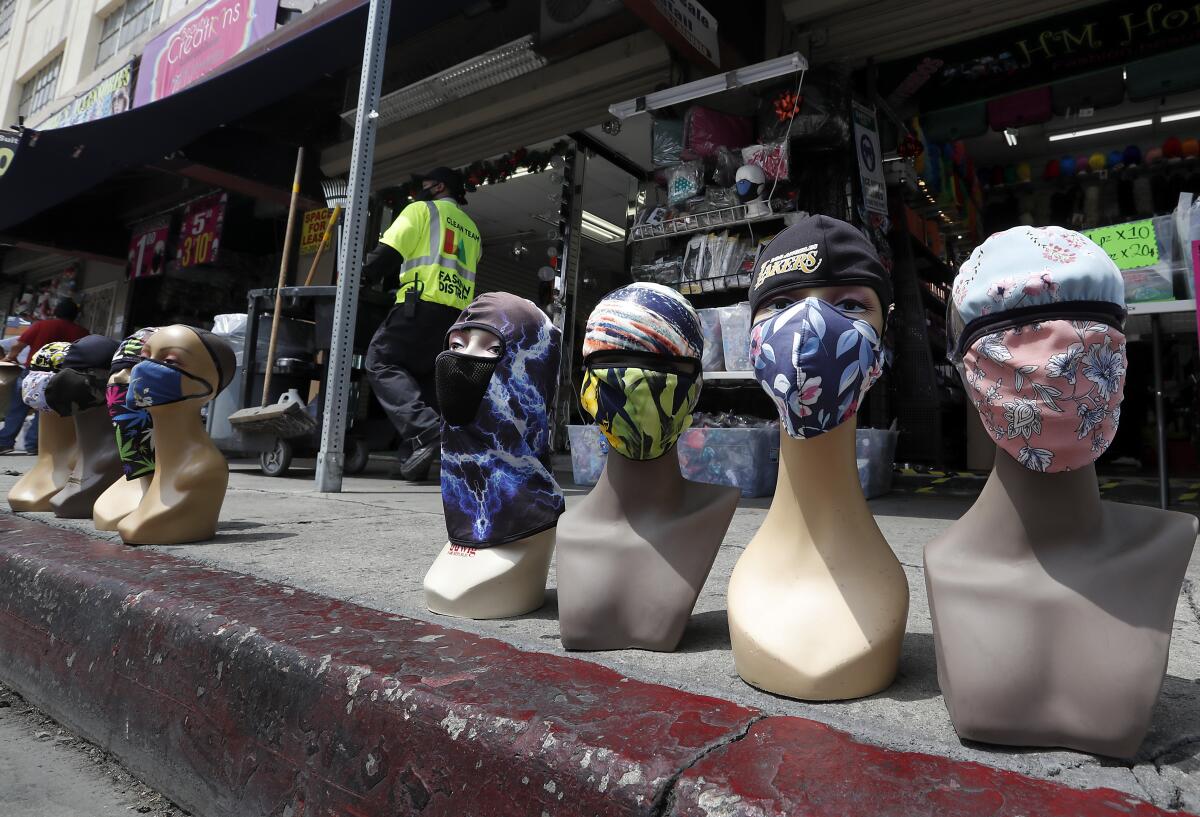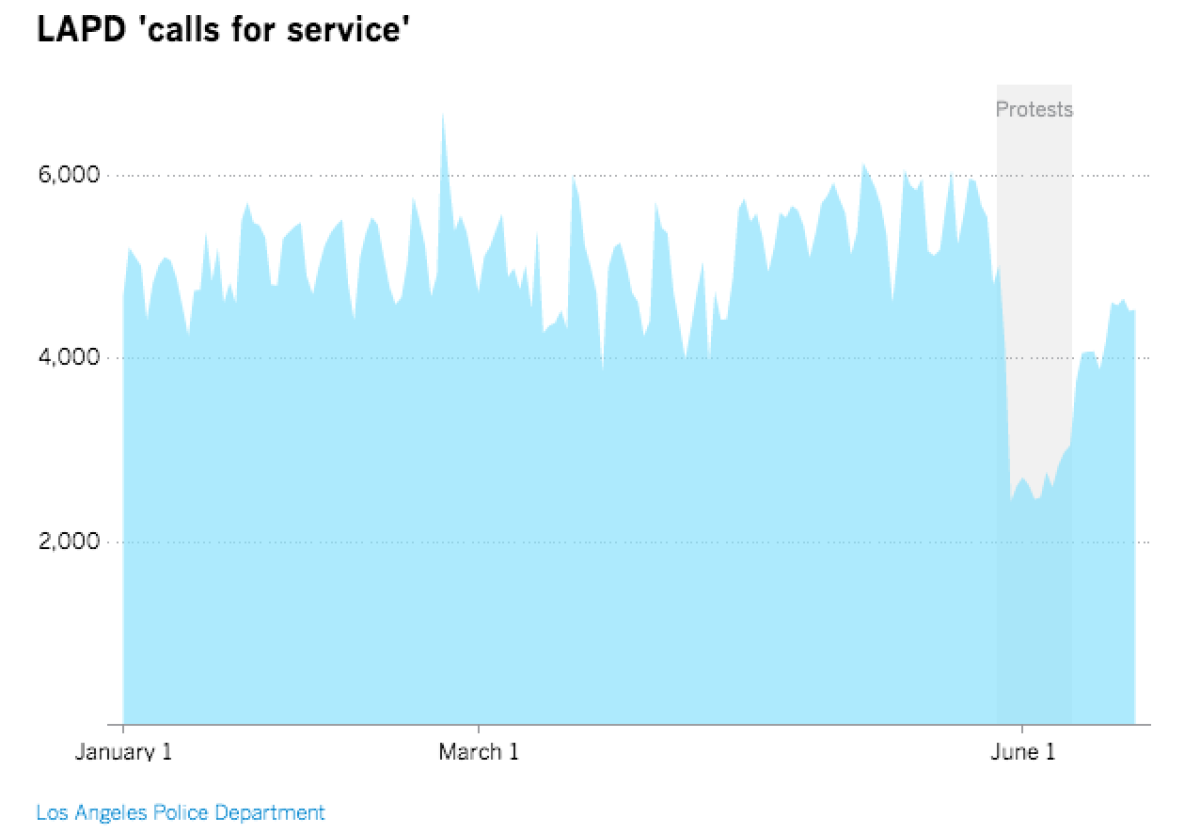Newsletter: An increasingly dire coronavirus landscape

Good morning, and welcome to the Essential California newsletter. It’s Tuesday, June 30, and I’m writing from Los Angeles.
Sign up for Essential California
The most important California stories and recommendations in your inbox every morning.
You may occasionally receive promotional content from the Los Angeles Times.
Let’s cut to the chase: Things are not looking good, and they are probably about to get worse.
Previously hailed as a coronavirus success story, California has seen its achievements at taming the curve rapidly deteriorate as cases grow.
Over the past 14 days, infections across the state have increased by 45% and hospitalizations have grown by 43%. The bulk of cases in the state are still concentrated in Los Angeles, followed by Riverside and Orange counties, respectively.
Speaking on Monday, a day after he had ordered a limited closure of bars in seven counties, Gov. Gavin Newsom hinted at further reversals and warned that the state will continue to pull back on reopening as the virus surges in California.
“Let me be forthright with you,” Newsom told Californians during a Monday news conference. “We are considering a number of other things to advance and we will be making those public as conditions change.”
The specter of an overwhelmed medical system
San Bernardino County officials announced several days ago that local hospitals were beginning to reach “surge capacity,” meaning they are getting close to hitting their licensed limits for the number of available beds. Riverside County intensive care unit beds nearly hit capacity Sunday, when patients occupied 99% of the normal number of beds. Suspected and confirmed coronavirus patients accounted for about 35% of those beds.
On Monday, Los Angeles County health officials sounded alarm bells about the worsening outbreak. As my colleague Ron Lin reports, officials said they are now faced with one of their biggest fears: that the reopening of L.A. County would coincide with sudden jumps in disease transmission that have the potential to overwhelm public and private hospitals.
[Read the story: “L.A. County issues dire warning amid ‘alarming increases’ in coronavirus cases” in the Los Angeles Times]
[See also: “‘We’re surging again.’ Doctors, nurses angry as coronavirus strains California hospitals” in the Los Angeles Times]
L.A. County is now projecting the possibility of running out of hospital beds in two to three weeks, with the number of intensive care unit beds potentially exhausted sometime in July.
What’s happening in Los Angeles County
Los Angeles, which has long been the state’s coronavirus hotbed, has seen “alarming increases in cases, positivity rates and hospitalization,” according to county Public Health Director Barbara Ferrer.
As Ferrer made clear, the surging L.A. numbers are not just the result of increased testing. They show that community transmission has “definitively” increased, as evidenced by the fact that the rate of positive tests in the county is nearing 9%. (The rate of those testing positive for infection statewide is now at 5.5%.)
And in a staggering revision, officials warned Monday that 1 in 140 county residents are probably unknowingly infected with the virus; the same projection was 1 in 400 as of last week.
The county announced that it will close beaches Friday and ban fireworks displays in anticipation of the Fourth of July holiday, a move health officials said is necessary in light of the alarming spike in cases.
“I know how much we look forward to this time of year,” Los Angeles Mayor Eric Garcetti said in a Monday evening news briefing. “But not this year. This year we have to think about saving lives to protect what we have in this country ... and to make sure our economy doesn’t take more steps backward.”
And now, here’s what’s happening across California:
The seeds of the latest surge in statewide cases appear to have been planted around Memorial Day, as reopenings accelerated, summer rituals beckoned and historic protests drew masses of people into the streets. It would take a few weeks of incubation. But it’s now clear that Memorial Day was the beginning of California’s turn from coronavirus success story to cautionary tale. A Los Angeles Times analysis has found that new coronavirus hospitalizations in California began accelerating around June 15 at a rate not seen since early April. Los Angeles Times
L.A. STORIES
As social unrest swept L.A., a curious trend emerged: Calls for police plunged. Calls for service handled by officers — incidents ranging from loud parties and fireworks to domestic disputes and traffic stops — declined nearly by half during the two-week demonstration period. Police call levels returned to normal only around June 9, the records show. Los Angeles Times

Parents are concerned as UCLA and USC football players return to campus. “I think it’s going to be incumbent upon schools and coaches and athletic departments and the university to really step up and make sure that these kids are safe and don’t become infected,” one UCLA football player’s mom said. Los Angeles Times
Support our journalism
POLITICS AND GOVERNMENT
California’s mask order tests the limits of Gov. Newsom’s executive power: Since shortly after the coronavirus outbreak began, Newsom has faced criticism from some over his ample use of executive authority during the COVID-19 pandemic. Los Angeles Times
The BET Awards mistakenly included former San Francisco Mayor Willie Brown Jr. in their “In Memoriam” segment during Sunday’s show. The 86-year-old retired politician remains very much alive. The show’s producers probably meant to spotlight former NFL star Willie Brown, who died in October at age 78. The Hollywood Reporter
CRIME, COPS AND COURTS
Chief Justice John G. Roberts Jr. and the Supreme Court’s liberal justices dealt a surprising setback to abortion opponents on Monday, striking down a restrictive Louisiana law and pledging to stand by past rulings that have upheld a woman’s right to choose abortion. Los Angeles Times
Golden State Killer pleads guilty to crimes that terrorized California. In a moment his victims have long awaited, 74-year-old former police officer Joseph James DeAngelo Jr. pleaded guilty to a long list of charges in a Sacramento university ballroom turned courtroom. The series of crimes ran from at least 1973 to 1986 and involved attacks on some 106 children, men and women. Fifty women were raped. Thirteen people were killed. Los Angeles Times
The deaths of Eric Garner in New York and George Floyd in Minnesota created national outrage over the use of deadly police restraints. But there were many others you didn’t hear about. A New York Times analysis found that at least 70 people have died in law enforcement custody after saying the same words, “I can’t breathe,” over the past decade. New York Times
HEALTH AND THE ENVIRONMENT
A massive brush fire in Imperial County destroyed dozens of homes. The fire tore through a town east of the Salton Sea overnight Sunday. Los Angeles Times
CALIFORNIA CULTURE
Twitch and Reddit banned content linked to President Trump for violating their rules against encouraging hate. “Hateful conduct is not allowed on Twitch,” the company said in an emailed statement. “In line with our policies, President Trump’s channel has been issued a temporary suspension from Twitch for comments made on stream, and the offending content has been removed.” Los Angeles Times
Petaluma bars are hopping even as nightspots become sources of outbreaks and shut down in other parts of the state. Most of the Bay Area currently limits bars to outdoor seating, but Sonoma County has allowed indoor dining since June 19. San Francisco Chronicle
A poem to start your Tuesday: “How to Start Over” by Stuart Kestenbaum. Poets.org
Free online games
Get our free daily crossword puzzle, sudoku, word search and arcade games in our new game center at latimes.com/games.
CALIFORNIA ALMANAC
Los Angeles: sunny, 76. San Diego: sunny, 71. San Francisco: sunny, 66. San Jose: sunny, 87. Fresno: sunny, 96. Sacramento: sunny, 93. More weather is here.
AND FINALLY
Today’s California memory comes from Carl Bell:
In the 1960s, on college breaks I was a Helms-man. Helms Bakery had been a Los Angeles institution for decades, starting in 1931 and was the official bread for the 1932 Olympics. Helms did home delivery; there were about 500 Helms trucks doing daily routes in Southern California, filled with the freshest bread, doughnuts, pies and cakes in town. We drove streets tooting our whistle, and moms and kids came running out. Helms was kinda like the gig economy, except for the fact that the drivers owned their trucks and the routes, were union members, and had paid vacations (I sub’d for vacationing drivers). Helms went out of business in 1969. The original bakery building still exists as the Helms Bakery District.
If you have a memory or story about the Golden State, share it with us. (Please keep your story to 100 words.)
Please let us know what we can do to make this newsletter more useful to you. Send comments, complaints, ideas and unrelated book recommendations to Julia Wick. Follow her on Twitter @Sherlyholmes.
Sign up for Essential California
The most important California stories and recommendations in your inbox every morning.
You may occasionally receive promotional content from the Los Angeles Times.




